In our cozy household, a curious incident unfolded. One day, my little brother stumbled upon an intriguing photo while browsing the internet. It was a captivating image of a rare bird he’d never seen before. Fueled by his curiosity, he felt a strong urge to learn more about this feathered marvel.
With determination in his eyes, he embarked on a quest to unveil the bird’s identity. He remembered hearing about reverse image search tools, and he decided to give it a try. Using one of the reliable tools, he uploaded the image, and within seconds, the search results revealed the bird’s name, habitat, and interesting facts.
As he shared his discovery with the family, we were all amazed by the power of technology and his insatiable curiosity. It was a small, yet delightful moment that illustrated how even the most ordinary days in our household could turn into adventures of learning and wonder. And here I am to help:)
Reverse image search tools are like magic detectives for pictures. Instead of typing in words to find pictures, you can use a reverse image search tool to find information about a picture you already have. Just upload the image, and the tool will find where that picture appears on the internet, what it’s related to, and sometimes even where it originally came from. It’s like having a super-smart friend who can recognize images and tell you more about them. These tools are handy for identifying objects, finding similar images, or even checking if a photo has been shared before on the internet.

Table of Contents
Are there privacy concerns when using reverse image search?
Some reverse image search tools may store your search history or uploaded images, so it’s a good practice to check their privacy policies. Additionally, avoid uploading personal or sensitive images when using these tools.
Is reverse image search limited to photos, or can it work with other types of images?
Reverse image search can work with various types of images, including photographs, screenshots, artwork, and graphics.
How does a reverse image search work?
Reverse image search tools work by analyzing the visual characteristics of an image, such as colors, shapes, and patterns. They then compare these characteristics with a vast database of indexed images from the internet to find matches.
What can I use a reverse image search for?
You can use reverse image search to find the original source of an image, discover visually similar images, identify objects or landmarks in a picture, and even check if an image has been altered or shared online.
Are reverse image search tools free to use?
Many reverse image search tools offer free usage with certain limitations, but some may have premium or paid features for more advanced searches.
These are some questions which might pop into one’s mind while dealing with them, let’s hop onto the main agenda.
Also Check ➤ ➤ Best PDF Search engines to find FREE E-Books | Get NOW!
The Main Agenda – Top Reverse Image Search Tools
TinEye
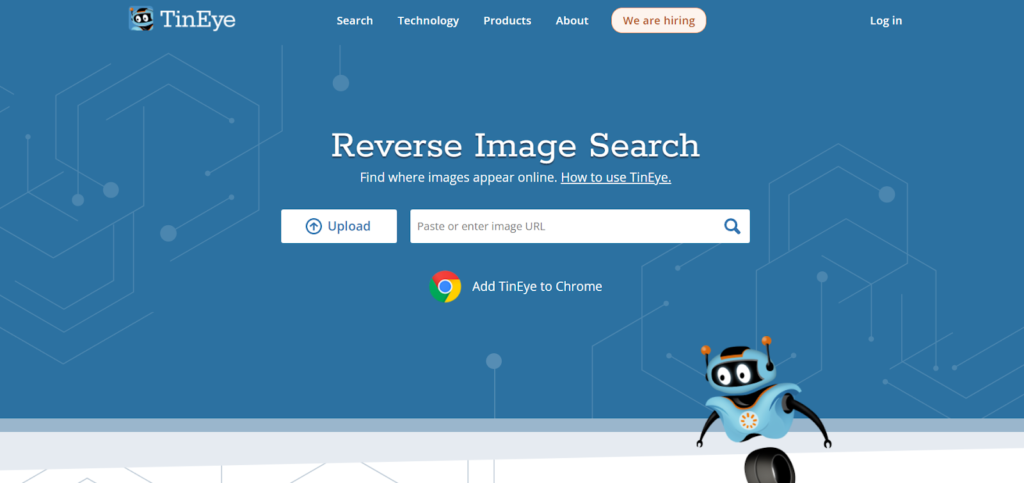
TinEye is a specialized reverse image search tool designed to help users find the original source of images or locate similar ones across the internet. Users can upload an image or input an image URL, and TinEye scans its extensive database to provide matches.
Unique Points: What sets TinEye apart is its focus on image searching, making it highly effective in this regard. It excels in finding exact and altered matches, making it a valuable tool for photographers, designers, and content creators. One unique aspect is its browser extension, which allows users to perform reverse image searches directly from their browsers, enhancing convenience.
Pros and Cons: The strengths of TinEye include its precision in finding matching and altered images, as well as its user-friendly browser extension. However, it may have limitations in terms of the number of free searches provided and the size of its image database. Additionally, it may not be as effective in finding similar images when compared to Google Image Search or other comprehensive tools.
Lenso.ai

Lenso.ai is a reverse image search platform that helps you find relevant images online. All you need to do is upload an image and start searching for the best possible matches or any relevant results. With AI-powered technology, you can easily find the images you’re looking for. Among other features, lenso.ai offers advanced face search capabilities. By analyzing key facial features, lenso.ai performs face searches with high accuracy, even in images with different angles, lighting conditions, and resolutions. If you perform an in-depth search, you can save images to Collections for easy reference or create an alert for specific images and receive email notifications when new image results become available.
Unique Points: Multiple categories; Unique face search engine; Alerts about new image results; Broad filter and sorting options.
Pros and Cons: Lenso.ai has advanced face search capabilities. Moreover, you can search across multiple categories, such as People, Places, Duplicates, and Related or Similar images. Additionally, you will find extensive filtering and sorting options to further refine your reverse image search. However, limited or outdated data may impact search results.
Google Image Search
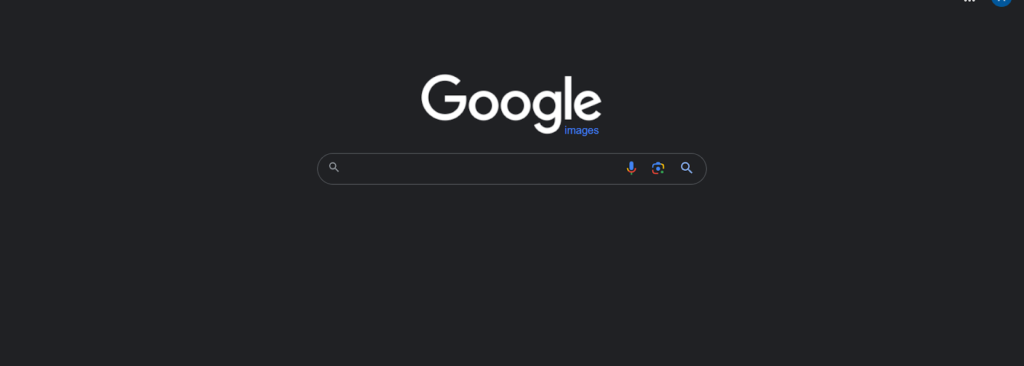
Google Image Search is a popular and widely used reverse image search tool. It allows users to upload images or provide image URLs to find visually similar images and discover their sources. The tool relies on Google’s extensive image database to match uploaded images with those available on the internet. It is known for its user-friendly interface, making it accessible to a broad audience.
Unique Points: Google Image Search stands out due to the vastness of its image database, which means it can often find matches for a wide range of images. Its integration with Google’s search ecosystem provides convenience, as users can directly access image results from the main Google search page. Additionally, it offers both mobile and desktop versions, making it accessible on various devices, and it’s particularly helpful for identifying the source of images that have been circulating on the web.
Pros and Cons: Google Image Search has a massive database, offers easy-to-use functionality, and is accessible on both mobile and desktop devices. It often delivers reliable results for identifying image sources. While it performs well, it may not always identify altered or slightly different versions of images, and some images may have minimal online presence, making them harder to trace. Google’s image search results may also lead to copyright or usage concerns if not used responsibly.
Also Check ➤ ➤ Best Cross-Platform Games (PS, Xbox, PC, Switch) to Try Today | PLAY NOW!
Bing Image Search
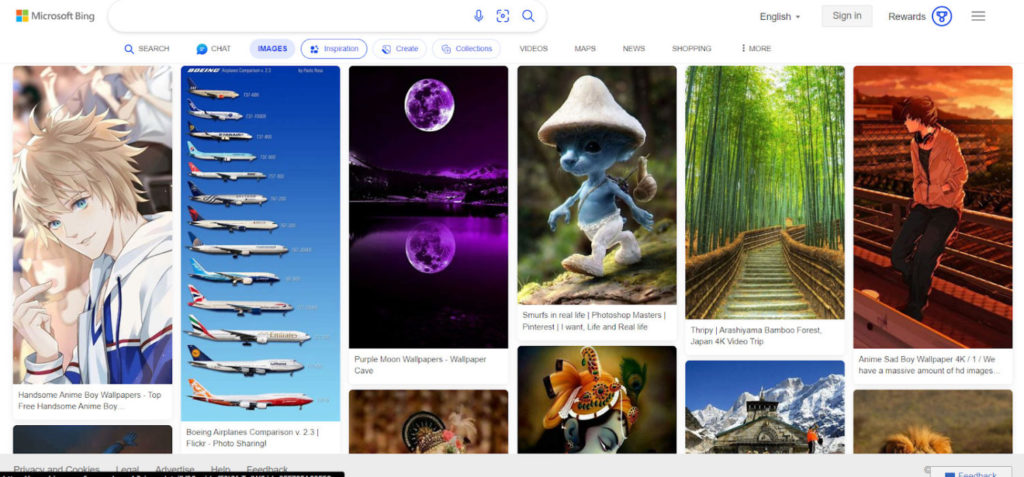
Bing Image Search is a reverse image search tool provided by Microsoft’s Bing search engine. Similar to Google Image Search, users can upload images or input image URLs to find matching images and their sources. The tool leverages Microsoft’s image recognition technology to deliver results, and it is a valuable resource for those looking to identify or trace the origin of specific images found on the internet.
Unique Points: One of the unique aspects of Bing Image Search is its integration with the Bing search engine, which can provide users with a holistic search experience. It’s especially useful for users who prefer Bing over other search engines. Bing Image Search also offers filters for refining image searches, such as by size, layout, color, and more. Additionally, it provides users with the ability to access images available under various usage licenses, which can be valuable for those looking for images they can legally use for their own purposes.
Pros and Cons: Bing Image Search is a powerful tool integrated with Microsoft’s search ecosystem, offering various search filters and providing image usage information. It can be a useful choice for users who prefer Bing as their primary search engine. While it provides a wide array of search options, Bing Image Search may not always have as extensive an image database as Google, potentially resulting in fewer image matches. The tool’s recognition capabilities may vary, and like other reverse image search engines, it may not always identify slightly altered images or those with limited online presence. Users should exercise caution when using images they find through the search in order to respect copyright and usage rights.
Pinterest Visual Search Tool
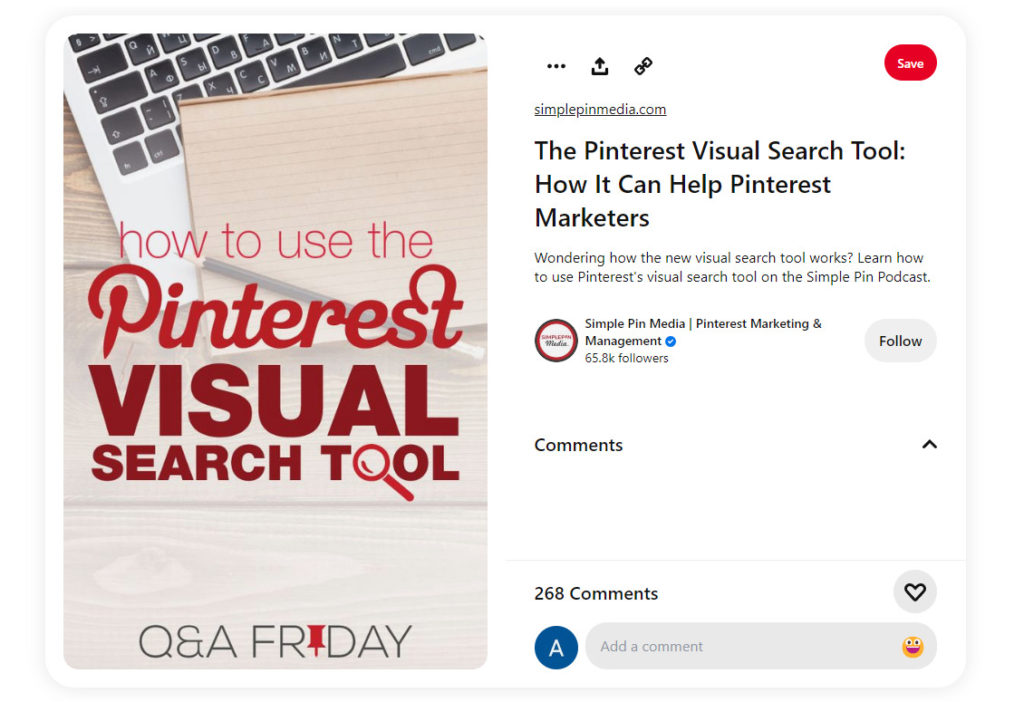
The Pinterest Visual Search Tool is a unique and innovative reverse image search feature offered by the popular visual discovery platform, Pinterest. This tool is designed to enable users to explore and discover similar images and items based on a particular image they upload. It leverages Pinterest’s vast database of visual content, which includes billions of images related to fashion, home decor, recipes, and various other categories. By simply uploading an image or clicking on a specific part of a pinned image on Pinterest, users can initiate a search that finds visually related content and helps them uncover new ideas and products.
Unique Points: The Pinterest Visual Search Tool is distinctive in that it seamlessly integrates reverse image search with the broader Pinterest platform, making it a valuable resource for creative inspiration and shopping discovery. It stands out by allowing users to not only find similar images but also to explore and purchase items related to the image they searched for. This feature is particularly beneficial for fashion enthusiasts, interior designers, and anyone looking for unique ideas. Pinterest’s extensive collection of visual content and user-generated pins adds to the uniqueness of this tool, offering a wealth of creative possibilities.
Pros and Cons: The Pinterest Visual Search Tool is a great source of creative inspiration and discovery for fashion, home decor, and DIY enthusiasts. It integrates reverse image search with e-commerce, enabling users to easily find and purchase products they discover. The tool’s vast database and visual content make it a rich source of ideas. The tool’s effectiveness may vary depending on the popularity and coverage of the images within Pinterest. It may not always provide precise matches for less common or niche images. Since the tool is closely tied to the Pinterest platform, it may encourage users to spend more time on the site, which can be a drawback for those looking for quick search results.
Also Check ➤ ➤ The Best Radio Automation Softwares|EXCEPTIONAL TOOLS!
Getty Images

Getty Images is a renowned and widely-used platform for high-quality visual content, primarily known for its vast collection of stock photos and videos. While it primarily serves as a source for licensing professional images, Getty Images also offers a reverse image search feature, allowing users to search for similar or matching images. This tool is particularly beneficial for those seeking to find the original source of an image or locate higher-resolution versions of pictures they come across online.
Unique Points: What sets Getty Images apart is the quality and authenticity of its content. It boasts a collection of images produced by professional photographers, ensuring that users can access top-tier visual resources. Getty Images is often used by media outlets, businesses, and creative professionals who require exceptional imagery for their projects. Its reverse image search can assist users in finding legally licensed versions of the images they discover online. The platform’s unique selling point is the reliability and credibility of its content, making it a preferred choice for users who need premium visuals.
Pros and Cons: Getty Images offers a source of high-quality, professionally shot images and videos. The reverse image search tool helps users identify the original source of images and locate authorized, licensed versions. It provides a platform for users to license and use premium visual content for various purposes. Getty Images primarily targets users who require paid licenses for their content, which may not be suitable for individuals looking for free or public domain images. The cost of using premium content can be a drawback for budget-conscious users. Additionally, the reverse image search tool is integrated into the broader Getty Images platform, which might be seen as less user-friendly compared to dedicated reverse image search engines.
Google Lens
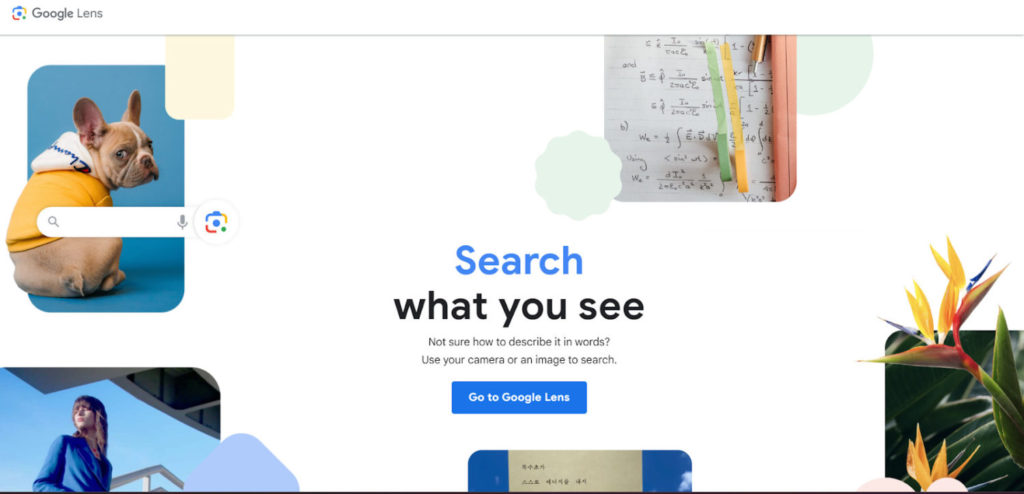
Google Lens is a versatile reverse image search tool and visual recognition application developed by Google. It’s accessible through a web interface and as a mobile app for Android and iOS devices. Google Lens allows users to upload images or use their device’s camera to conduct reverse image searches. By analyzing the content of the image, it provides information about objects, text, and entities present within the picture. Additionally, it can recognize and translate text, identify plants and animals, scan barcodes, and more.
Unique Points: Google Lens stands out due to its multifaceted capabilities. While it excels at reverse image searches, it also offers a wide range of other visual recognition features, making it a comprehensive tool for users seeking more than just image source information. Its integration with Google Search enables users to access a wealth of information about the objects or scenes within their images. Moreover, Google Lens can be used for practical purposes like translating foreign language text in real-time or identifying landmarks and plants, which goes beyond traditional reverse image searching.
Pros and Cons: Google Lens is available both as a web tool and a mobile app, offering flexibility and accessibility across different devices. Its wide range of features, including translation, object recognition, and more, makes it a versatile tool for various visual recognition needs. Being backed by Google’s extensive database, it often provides rich and reliable search results. While Google Lens offers numerous features, some users may find its interface complex or overwhelming due to the variety of functions it performs. The tool’s performance depends on the quality of the camera and image, which can sometimes lead to less accurate results for certain queries. Additionally, Google Lens may not be as specialized as dedicated reverse image search engines for certain image-related tasks.
Also Check ➤ ➤ COMPLETE! – Investor review for Spacemesh | Dive Now!
Yandex Images

Yandex Images is a reverse image search tool provided by Yandex, a Russian multinational IT company known for its web search engine. This tool is designed to help users find similar images and their sources by using Yandex’s extensive database. To perform a reverse image search, users can either upload an image or enter the URL of an image they want to search for. Yandex Images then scans its vast collection of indexed images to provide matches and related information.
Unique Points: One standout feature of Yandex Images is its access to a large number of Russian and international websites. This gives it an advantage when searching for images that may not be as prevalent on Western-centric search engines. Additionally, Yandex has developed advanced algorithms for content analysis and similarity detection, which can be helpful in finding visually similar images. For users looking to explore a broader range of sources and perspectives, Yandex Images can be a valuable tool.
Pros and Cons: Yandex Images leverages the strength of the Yandex search engine, making it proficient in searching a wide variety of sources, including Russian websites. It has advanced algorithms for matching visually similar images, increasing the likelihood of finding the image source. The tool is user-friendly and available for free, making it accessible to anyone with an internet connection. Yandex Images primarily focuses on the Russian market, which might limit its effectiveness for those searching for images related to other regions or languages. While it stands out in the Russian-speaking community, its presence and usage might be less prevalent in Western countries. Furthermore, some users may have concerns about data privacy and security when using a search engine from a country with different regulations.
Veracity
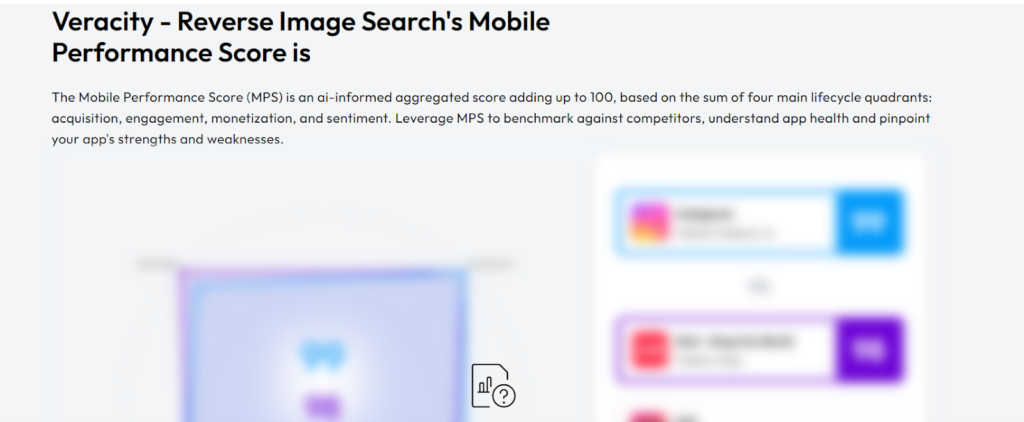
Veracity is a reverse image search tool designed for iOS devices, developed by Data.ai. This mobile app allows users to perform reverse image searches directly from their iPhones or iPads. With Veracity, you can upload images or use photos from your device’s camera to find similar images and discover the original sources or related web pages. It provides a convenient way for users to access reverse image search capabilities on the go.
Unique Points: What sets Veracity apart is its mobile-centric approach to reverse image searching. It offers a user-friendly interface and a seamless experience tailored to iOS users. While there are various web-based reverse image search engines, Veracity’s mobile app is dedicated to this purpose, ensuring that iPhone and iPad users have a tool optimized for their devices. This makes it a handy solution for people who want to perform image searches while using their iOS devices.
Pros and Cons: Veracity’s mobile app simplifies the process of conducting reverse image searches, allowing iOS users to find similar images and source information easily. It’s optimized for the mobile platform and offers an intuitive user experience. The app is available for iOS, providing a dedicated solution for Apple device users. The accessibility of Veracity is limited to iOS users, which may exclude Android and other device users from its benefits. Additionally, the effectiveness of reverse image searches can vary based on the search engine or database that Veracity accesses. Like other reverse image search tools, it may not always provide accurate or complete results, depending on the quality of the database it accesses.
Also Check ➤ ➤ Best 10 FREE Transcription Tools – The Ultimate Guide!
Conclusion
TinEye is a dedicated reverse image search tool that excels at finding similar images and their sources on the web. Its unique ability to locate exact matches, even for slightly altered images, sets it apart. However, the free version has limitations, and its database might not be as extensive as some other tools.
Google Image Search, a household name, offers a straightforward and effective way to conduct reverse image searches. With its vast database and accessibility, it’s a reliable option for quick searches. Still, it doesn’t have some advanced features that specialized tools provide.
Bing Image Search, integrated into the Bing search engine, is user-friendly and offers a seamless experience. However, it may not always deliver results as comprehensive as Google’s. Pinterest’s Visual Search Tool is perfect for searching within the Pinterest platform, making it an excellent choice for Pinterest users. Its niche use may not be suitable for broader web searches.
Getty Images, while primarily known for image licensing, offers a powerful reverse image search tool that’s invaluable for photographers and image researchers. However, it might be an overkill for the average user. Google Lens, with its multifunctional visual recognition capabilities, is a versatile tool that extends beyond reverse image searches. Still, its interface complexity may be overwhelming for some.
Yandex Images is a unique offering, as a Russian search engine, it’s a strong choice for users seeking results from Russian sources. Veracity is an iOS app that specializes in reverse image searches on mobile devices, making it a handy tool for users on the go. In summary, your choice should depend on your specific needs and preferences, whether you seek a specialized tool or a multifunctional option.









